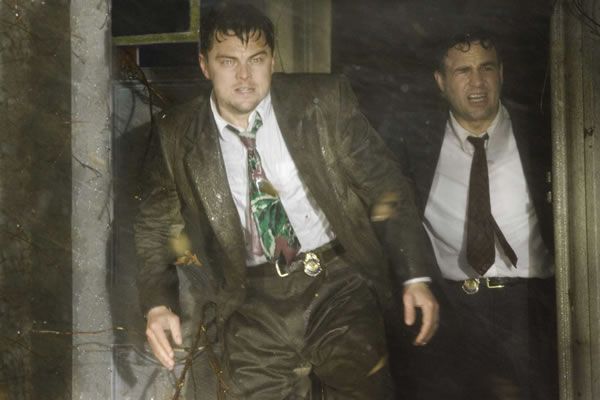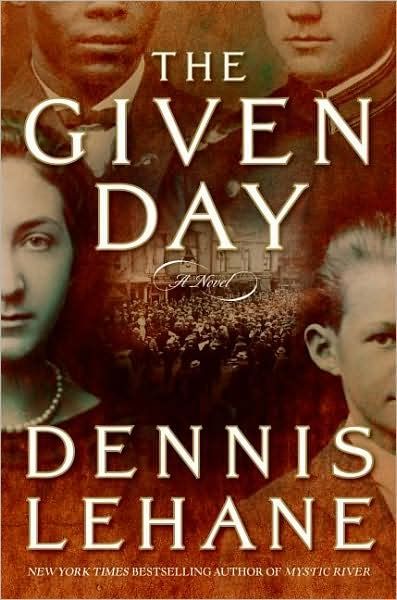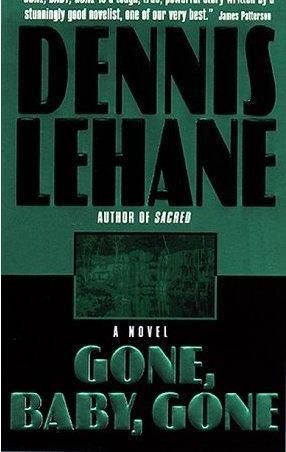With Martin Scorsese’s adaption of his novel Shutter Island being released on DVD and Blu-ray next week, I had the chance to interview author Dennis Lehane by phone yesterday. Lehane is the best-selling author of 10 novels, including Gone, Baby, Gone and Mystic River. He was also a staff writer on David Simon’s The Wire from seasons 3 to 5 and is currently working on adapting his short story Animal Rescue for Fox 2000.
Since Lehane’s direct involvement in bringing Shutter Island to the big screen was fairly limited, we spent a lot of time talking about other subjects, including:
- How THR erroneously reported last week that he was writing a script with Paul Tamasy (Air Bud)
- Why he doesn’t ever want to adapt his own novels for the screen
- His golden rule for dealing with Hollywood
- Which novel made him decide to become a writer
- Why he prefers TV to movies and what his favorite shows are
- Why we’ll never see the movie he wrote and directed in the 90s
All this and more after the jump!
You can either read the transcript below or listen to the interview by clicking here.
Question: I noticed that Shutter Island is the first film that you’ve actually been listed as an Executive Producer on, and I was curious if that was an actual change in your involvement with the film or it was just something they just added as a courtesy.
Dennis Lehane: Oh, no, it wasn’t a courtesy. [chuckles] “What do you give your secretary instead of a raise? You give her an associate producer credit.”
Exactly.
Lehane: No, no, it was something that very early on I wanted to be active in terms of, you know right from the get-go, when I got the rights back to Shutter Island, I wanted to be extremely proactive in terms of who I sold the rights to, who was on that short list, where we went in terms of - once they became involved - in terms of who we went to, screenwriters, directors, etc. etc. Then once you get to that point where you have a locked script and you have a director, I think you’re, you know, you’re about as useful as a eunuch at a stud farm, I mean there’s just no point to stick around after that, whether you are a producer or a writer or whatever. Cause then you let the talent come in and do their thing.
So you were active in getting Scorsese on board?
Lehane: I was active in having conferences about that, yes. Yes. Was I active in picking up the phone? No, that was [producer] Brad Fischer actually.
Okay, but as executive producer you had a lot of the say on the names that were being tossed around as possibilities.
Lehane: Yeah, we were all, you know . . . It’s a weird situation. Once you all agree, once you all of the same sort of . . . you’re on the same page in terms of taste, these decisions become very fluid. They don’t become . . . [brief interruption] There’s not a chain-of-command kind of vibe. You know what I mean?
Yeah.
Lehane: If that makes any sense. So yeah, it was just sort of, okay, this is where we want to go with this. And then Brad went and got [screenwriter] Laeta [Kalogridis] and it was like “okay, well yeah, perfect” and then after Laeta writes the script and then its “okay, who do we go to now? Well, who’s our list?” You know, who’s on the list? And it was a very short list. And the fact that we got the ultimate director, well that’s something I’ll be stunned about until the day I go to my grave.
Yeah. Actually, speaking of Laeta, when you were tossing around names for possible screenwriters did you ever personally consider yourself to adapt the book?
Lehane: No.
Why is that?
Lehane: Never, never, never. Never. Never comes up. Because it’s like a doctor operating on his child is how it feels like to me. I bust my ass to get a book down to say 350 pages or 401 pages or 700 pages in the case of my last book. I’m not playing around with saying “I really want to write a 700-page book”. I’m saying “what’s the least amount of wording I can do to tell this story?” Once I get there, I don’t want to then turn around and say, “oh and now carve out the rest of it to get it to 135 pages for a script.” I couldn’t do it. I have no idea what I’d . . . I’m the last person I’d trust.
I can understand that. Actually I’ve heard that quote before from you about not wanting to operate on your own baby. I was curious; as far as I understand you are adapting your short story Animal Rescue into a film, is that correct?
Lehane: Right, but that’s a short story-
Exactly, that makes perfect sense to me now.
Lehane: Okay, good.
Speaking of Animal Rescue, does that have a director attached to that yet?
Lehane: No director. Producers. It’s with Peter Chernin’s company at Fox. Mike Larocca, I’m trying to think of the other people involved. I’ve got to finish the script and then you get into whether the script sucks or not. And then once you have a locked script, then you go find a director.
And what about The Given Day? Two years ago it was announced that that was going to be directed by Sam Raimi. Is that still moving forward?
Lehane: I don’t know, you’d have to talk to Sam. I mean, we’ve had a few conversations about it and then he hired a screenwriter, I think. And that’s the last I heard of it. I just don’t get involved. My rule on Hollywood is: I don’t call them, they call me. And till then . . .
That makes sense.
Lehane: Yeah, because I think writers, there’s a lot of just raging insecurity out there and a lot of writers . . . there’s a difference between protecting your work, which is smart, and insinuating yourself into situations where you don’t belong. And I think a lot of writers have a hard time figuring out what the difference between those two is. So, Sam Raimi is . . . I put my faith in Sam, I put my faith in the studio, I put my faith in everybody involved. I took their money. Until they need me again, there’s no need for me to be bugging anybody. So that’s how I feel. That’s what I feel I would be doing. So they have my faith; hopefully everything’s working out.
That’s fair. From the research that I’ve done, I believe you also have a third script in development, which is Depravity.
Lehane: Okay, this is bizarre! I just heard of this today. I have no connection to this thing.
Really?
Lehane: Apparantly it was reported in the LA Times that I’m writing something called Depravity. And I’m writing it with somebody else.
Yeah, Paul Tamasy is what it said, the creator of Air Bud.
Lehane: Oh, yeeaah . . . uh, no. No connection. Maybe it’s Tim LaHaye? I don’t know. I don’t know who is writing this script, but it’s not me. I’ve never even heard of this.
So, have you heard of Berkeley Square Films? Because that’s the production company.
Lehane: Nope.
Okay. We’ll it’s good to get that cleared up.
Lehane: I think somebody just made a weird misquote. I don’t think anyone’s out there representing that I’m actually writing on a script; I think somebody made a mistake, said the wrong name and somebody ran with it.
Okay.
Lehane: Believe me, I’m going to have attorneys looking into it. But it’s not, you know. . . It’s pretty kooky.
Yeah, it’s actually even up on IMDb as that being one of your productions in development.
Lehane: How bizarre. Wow.
Then, other than Animal Rescue and The Given Day, do you have any other projects, any other film projects in the works that we should know about?
Lehane: None that I can discuss right now, no.
Okay, that’s fair.
Lehane: And then I just finished a book, so . . .
Moonlight Mile, correct?
Lehane: Yeah. Yeah, that’ll be out in November.
Then what’s after that, in terms of novels? Do you know?
Lehane: Yeah, my next novel is going to be set during prohibition.
Is that going to be a sequel to The Given Day? Or something completely separate?
Lehane: Not a sequel. It’s going to have one of the characters from the novel, The Given Day. Although, not a major character from The Given Day. It’ll be a major character in the new novel.
Who are some of your favorite writers, who have inspired you the most?
Lehane: Richard Price, William Kennedy, Elmore Leonard, Pete Dexter, Hubert Selby.
Do you have an absolute favorite?
Lehane: In terms of direct- I have a lot of favorites. I love Gabriel Garcia Marques, but I wouldn’t call him an influence, you know what I mean?
Yes.
Lehane: In terms of influence, the most influential book on me was Richard Price’s The Wanderers. That’s the book, that’s the life-changer. That’s the book that made me want to become a writer. I glommed onto urban novelists. That’s what I’m happiest with, you know? Any book set in a city is going to grab me.
That kind of dovetails into my next couple questions. You worked with David Simon on The Wire, which is definitely set right in a city. I know that you’re not really interested in television in general, do you see yourself ever working-?
Lehane: No I am! I would say that is a mistake to say that I’m not interested in television. Definitely, I am. I love television. I think we’re in a renaissance of epic proportion in television right now.
So, do you see yourself working in television again anytime soon?
Lehane: Yeah, yeah. I have no trouble with that. I think the best stuff, maybe not the best stuff, but the stuff most conducive to my sensibility is not in film right now, it’s in premium cable television. You know the stuff that jazzes me up, that gets me excited tends to be coming out of HBO, Showtime, Starz, AMC, a lot more than the multiplex.
Can you give me some names of the shows that jazz you the most?
Lehane: Oh, sure. Obviously, the Sopranos, when it was on. Deadwood, when it was on. But now you’re looking at shows like Mad Men, certainly, and Breaking Bad is exceptional. Nurse Jackie is pretty damn good. And Justified is a fun throwback on FX right now. Treme. There’s a lot of really interesting stuff going on out there, but it’s all coming out of that region. You know last night my wife and I – my mother-in-law offered to take our baby and let us go to a movie and I couldn’t think of anything I wanted to see.
Right.
Lehane: You know which is sad, it’s really sad.
It is.
Lehane: But it was like, Iron Man 2? I can wait. Robin Hood? That can wait. You know? Yeah, so I think where my sensibilities are tuned is more and more becoming a funnel towards TV. Far more than film. We’ll see. I mean, I’m writing a film right now, we’ll see what happens.
What was the last film that you really got excited about seeing?
Lehane: The last film that I got really nuts about I would say was The Hurt Locker. I saw that three times in one summer. I liked Up In The Air a lot.
What can you tell me about your movie Neighborhoods?
Lehane: Oh, God. Oh, yeah, no that’s dead, man. [laughs] It was an independent. It was made must be 12 years ago. Even if there was an audience for it, it’s 12 years dated. It was this little low budget romantic comedy and it just didn’t quite get out of the starting blocks. You know it was made, we made it, we edited it, we shot it, we scored it, you know, the whole thing, but it ultimately didn’t amount to anything. Sometimes that happens.
Is there any way to see it?
Lehane: No, never! My wife hasn’t seen it, let’s put it that way.
Wow.
Lehane: [laughs] Yeah, no it’s too old now, it’s too dated. It’s just not something I’d- Would you show your first drafts to the world?
Absolutely not.
Lehane: That kind of thing.
Shutter Island gets released June 8th on Blu-ray and DVD.



